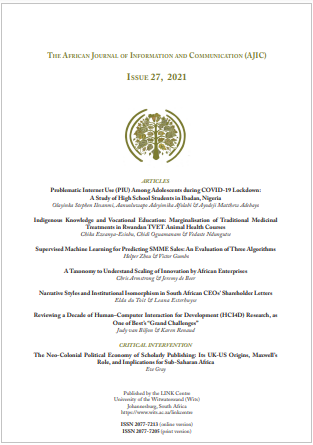Reviewing a Decade of Human-Computer Interaction for Development (HCI4D) Research, as One of Best's "Grand Challenges"
Keywords:
Human-computer interaction for development (HCI4D), Information and communication technology for development (ICT4D), Human-computer interaction (HCI), Guidelines, Michael BestAbstract
The human-computer interaction for development (HCI4D) field emerged at the intersection of the fields of information and communication technology for development (ICT4D) and human-computer interaction (HCI). In 2010, Michael Best nominated HCI4D as one of ICT4D's "grand challenges". This HCI4D field is now entering its second decade, and it is important to reflect on the research that has been conducted, and to consider how HCI4D researchers have addressed the challenge that constitutes the raison d'etre of HCI4D's existence. Best provided four guidelines to inform researchers embracing this challenge. This study commences by identifying the primary HCI4D-specific themes, and then carries out a systematic literature review of the HCI4D literature to build a corpus to support the analysis. The corpus is analysed to reflect on how well the field's practices align with Best's guidelines. The overall finding is that HCI4D researchers have largely been following Best's guidelines and that the HCI4D field is demonstrating encouraging signs of emerging maturity.
References
Abdelnour-Nocera, J., & Densmore, M. (2017). A review of perspectives and challenges for international development in information and communication technologies. In Annals of the International Communication Association, 41(3-4), 250-257. https://doi.org/10.1080/23808985.2017.1392252
Bai, Y. (2018). Has the Global South become a playground for Western scholars in information and communication technologies? Scientometrics, 116(3), 2139-2153. https://doi.org/10.14207/ejsd.2014.v3n1p13
Best, M. L. M. (2010). Understanding our knowledge gaps: Or, do we have an ICT4D field? And do we want one? Information Technologies & International Development, 6, 49-52.
Bramer, W. M., De Jonge, G. B., Rethlefsen, M. L., Mast, F., & Kleijnen, J. (2018). A systematic approach to searching: An efficient and complete method to develop literature searches. Journal of the Medical Library Association, 106(4), 531-541. https://doi.org/10.5195/jmla.2018.283
Brown, A., & Grant, G. (2010). Highlighting the duality of the ICT and development research agenda. Information Technology for Development, 16(2), 96-111.
Chetty, M., & Grinter, R. (2007). HCI4D: How do we design for the Global South? Paper presented to User Centered Design and International Development Workshop at CHI, 28 April-3 May, San Jose, CA.
Dell, N., & Kumar, N. (2016). The ins and outs of HCI for development. In Proceedings of the 2016 CHI Conference on Human Factors in Computing Systems - CHI '16 (pp. 2220-2232). https://doi.org/10.1145/2858036.2858081
Grant, M. J., & Booth, A. (2009). A typology of reviews: An analysis of 14 review types and associated methodologies. Health Information and Libraries Journal, 26(2), 91-108. https://doi.org/10.1111/j.1471-1842.2009.00848.x
Ho, M. R., Smyth, T. N., Kam, M., & Dearden, A. (2009). Human-computer interaction for development: The past, present, and future. Information Technologies & International Development (ITID), 5(4), 1-18.
Ho, M. R., & Veeraraghavan, R. (2008). Bridging the divide between theory and practice in ICT for development. IDEALS Conference, University of Illinois.
Kitchenham, B., Brereton, O. P., Budgen, D., Turner, M., Bailey, J., & Linkman, S. (2009). Systematic literature reviews in software engineering - a systematic literature review. Information and Software Technology, 51(1), 7-15. https://doi.org/10.1016/j.infsof.2008.09.009
Kondrat'ev, N. D. (1984). The long wave cycle. Richardson & Snyder.
Miles, M. B., Huberman, M., & Saldana, J. (2019). Qualitative data analysis: A methods sourcebook (4th ed.). Sage.
Moher, D., Liberati, A., Tetzlaff, J., Altman, D. G., & Prisma Group (2009). Preferred reporting items for systematic reviews and meta-analyses: The PRISMA statement. Annals of Internal Medicine, 151, 264-269. https://doi.org/10.1016/j.ijsu.2010.02.007
Okoli, C. (2015). A guide to conducting a standalone systematic literature review. Communications of the Association for Information Systems, 37(1), 879-910. https://doi.org/10.17705/1CAIS.03743
Paré, G., Trudel, M. C., Jaana, M., & Kitsiou, S. (2015). Synthesizing information systems knowledge: A typology of literature reviews. Information and Management, 52(2), 183-199. https://doi.org/10.1016/j.im.2014.08.008
Patterson, D. J., Sim, S. E., & Aiyelokun, T. (2009). Overcoming blind spots in interaction design: A case study in designing for African AIDS orphan care communities. Information Technologies & International Development, 5(4), 75-88.
Sen, A. (2001). Development as freedom. Oxford Paperbacks.
Toyama, K. (2010). Human-computer interaction and global development. Foundations and Trends in Human-Computer Interaction, 4(1), 1-79. https://doi.org/10.1561/1100000021
Van Biljon, J., & Renaud, K. (2018). Reflections on the maturity of the mobile communication technology for development (M4D) landscape: 2008-2016. In R. Baguma, & J. S. Pettersson (Eds.), Proceedings of the 6th International Conference on M4D Mobile Communication Technology for Development (pp. 7-18), Kampala.
Van Biljon, J., & Renaud, K. (2019). Human-computer interaction for development (HCI4D): The Southern African landscape. In IFIP 9.4 International Conference on Social Implications of Computers in Developing Countries (Vol. 1). Springer.https://doi.org/10.1007/978-3-030-19115-321
Van Biljon, J. (2020). Knowledge mobilization of human-computer interaction for development research: Core issues and domain questions. Information Technology for Development, 26(3), 551-576. https://doi.org/10.1080/02681102.2020.1767022
Walsham, G. (2017). ICT4D research: Reflections on history and future agenda. Information Technology for Development, 23(1), 18-41. https://doi.org/10.1080/02681102.2016.1246406
Winters, N., & Toyama, K. (2009). Human-computer interaction for development: Mapping the terrain. Information Technologies & International Development, 5(4), iii-viii.
Yadav, D., Malik, P., Dabas, K., & Singh, P. (2019). Feedpal: Understanding opportunities for chatbots in breastfeeding education of women in India. In Proceedings of the ACM on Human-Computer Interaction, 3 (CSCW) (pp. 1-30).
Downloads
Published
Issue
Section
License
Copyright (c) 2021 Judy Van Biljon, Karen Renaud

This work is licensed under a Creative Commons Attribution 4.0 International License.
How to Cite
- Abstract 553
- PDF 187


.png)